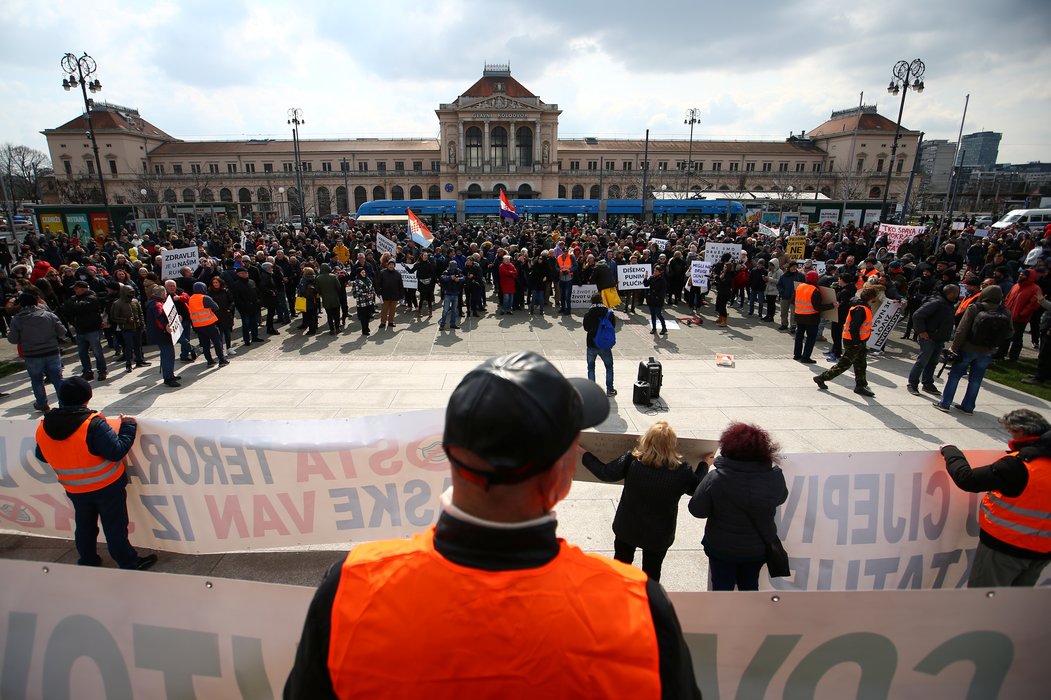
Peaceful Assembly
Protests against COVID-19 continued in this reporting period. Protesters in Split called for freedom of choice, for an end to wearing masks, ending the online classes and ending attempts for compulsory vaccination and testing. A cry for freedom protest was also organised in Zadar. Protesters emphasised that the restrictive measures represent a serious infringement on basic human rights and are most detrimental to young people and their healthy development.
Protests were held for several days outside the Krapinske Toplice Primary School in support of a parent whose child, after refusing to wear a face mask, had been banned from entering the school. After protesters stormed the school building, security guards were hired. The guards protected students and teachers entering the building as anti-maskers continued to protest. Police have filed several complaints against the student's parents as the stand-off continued, and filed misdemeanor charges against eight persons protesting outside a primary school for attempting to disturb the public peace, holding an unreported public assembly in a place where public assemblies are not allowed, refusal to wear a protective mask indoors, and refusal to show police one's ID card.
Peaceful protests on environmental issues also took place in the reporting period, such as the protest by Valpovština citizens against the devastation of pollution on the river Karašica. A protest against the detrimental effects of the hydropower-plant "HE Lešće" on the river Dobra was also organised. In Štinjana, about twenty locals stopped construction in their area which they deem is “illegal”, after an investor’s excavator was supposed to quickly demolish the illegally built foundations, all in the midst of the tourist season.
Expression
The Media Pluralism Monitor 2021, detailing threats to media pluralism and freedom in European Union member states and some candidate countries, noted that the regulation of the media sector has been stagnant for years, which has resulted in the deterioration of media pluralism. The report also highlights the insufficient legal framework for the protection of journalists, while journalists are often the target of strategic lawsuits (SLAPP) and defamation charges.
The Croatian Journalists' Union has warned about the increasingly aggressive attacks on journalists who are doing their jobs professionally. The Union noted that many of these attacks do not stop at verbal insults and called on the police to enable journalists to report freely and safely. One of the latest attacks was on the journalist Ivan Kovačić, who was the first to report on the protests in Krapinske Toplice (see above). Kovačić was the target of an incitement campaign on social networks, which included doxing, where his name and mobile phone number were published online for days, with calls to harass and threaten him.
In regard to the drafting of the new Electronic Media Act, the Croatian Journalists' Association (HND) once again submitted remarks and proposals which it considers necessary to be included in the new legal text. HND also joined an appeal by the Copyright Society, whose remarks were not included in the Final Draft of the Law on Copyright and Related Rights. According to the draft, all copyrights of journalists and photojournalists are transferred to publishers, making the situation in the media very unfavourable for journalists who do not have much bargaining power. On the other hand, the Minister of Culture and Media, Nina Obuljen Koržinek, said that the biggest contributionof the Copyright Act is that it eliminates the current legal uncertainties related to the use of exceptions and restrictions from copyright and related rights.